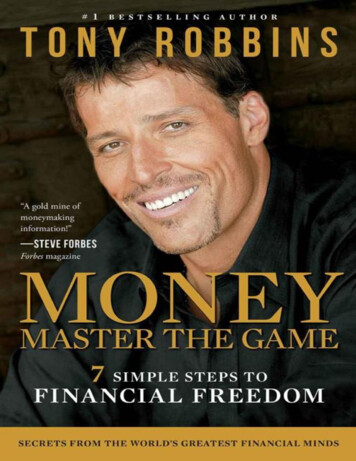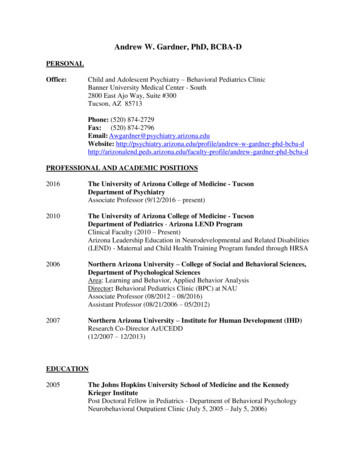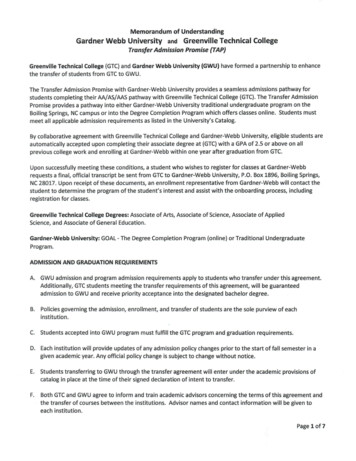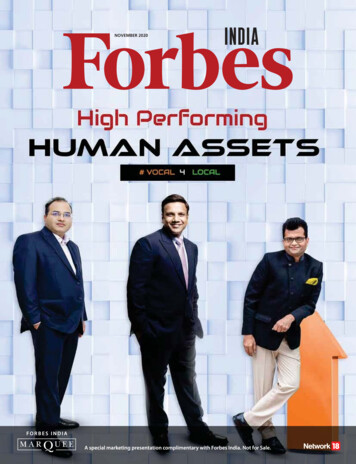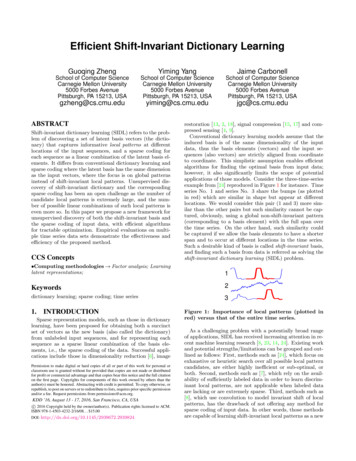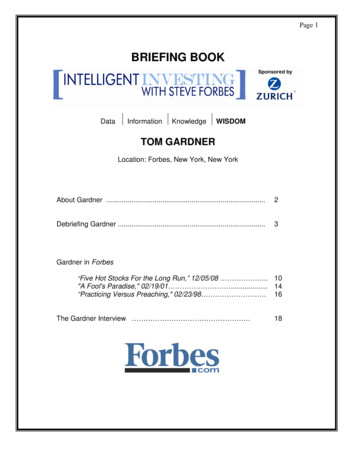
Transcription
Page 1BRIEFING BOOKDataInformationKnowledgeWISDOMTOM GARDNERLocation: Forbes, New York, New YorkAbout Gardner .2Debriefing Gardner .3Gardner in Forbes"FiveHot Stocks For the Long Run,” 12/05/08 . 10"A Fool's Paradise," 02/19/01 . 14“Practicing Versus Preaching," 02/23/98 . 16The Gardner Interview 18
Page 2ABOUT TOM GARDNERIntelligent Investing with Steve ForbesTom Gardner is the chief executive officer andco-founder of The Motley Fool, an investmentand personal-finance advisory service thatadvocates for investors.Gardner is the lead analyst and director of theMotley Fool Hidden Gems investmentnewsletter service. He and his brother, David,whom he co-founded the firm with, have alsoco-authored several best-selling books,including The Motley Fool Investment Guide,You Have More Than You Think: The MotleyFool Guide to Investing What You Have, andRule Breakers, Rule Makers. The brothers alsooversee The Motley Fool's nationally syndicatednewspaper column and are co-advisors of themarket-beating Motley Fool Stock Advisorinvestment newsletter service.Gardner has testified before the United StatesSenate, calling for greater transparency in thefinancial-services industry.He graduated with an honors degree in English and creative writing from Brown Universityin 1990 and received an honorary Ph.D. in humane letters from Strayer University in 2000.
Page 3DEBRIEFING GARDNERIntelligent Investing with Steve ForbesInterview conducted by Alexandra ZendrianSeptember 16, 2009Forbes: How did The Motley Fool get started? Where does the name come from?And what is it like founding this company with your brother?Tom Gardner: The Motley Fool really started in 1993 as a printed newsletter. We attractedthe attention of America Online in 1994 and started a business. So as a formal businesswe began in 1994, 15 years ago.The origin of the name The Motley Fool comes from Shakespeare's As You Like It. Thefool was obviously a main player on both Shakespearean stages and also in Elizabethancourt as the character that had an opportunity to tell the king and the world the truthwithout putting himself in harm's way. Or herself, there were female fools. As long the foolmaintained his sense of humor, he could actually provide some pretty withering criticism ofthe world as the fool saw it. So for us there is a rich literary tradition that we can call uponwith foolishness, whether it's Shakespeare or a variety of great quotes from other authorsand philosophers over time about foolishness.In our approach to investing, foolishness means not believe that you're an authority. We'reessentially a company aspiring to build the world's greatest investment community andreally the only way you can do that is if you don't believe you have a central source ofexpertise, but rather that you're able to draw from people all around the world and all walksof life and you don't denigrate somebody who could be an 18-year-old investor in Omaha,Neb., who ends up being Warren Buffet, but in other circles he might be treated as an 18year-old punk and what does he know about business and investing. We have big ears forthe ideas around the world and we try to have fun. I think our Motley Fool culture is prettyunique, both in the world of finance and in business in general. I won't bore you with givingyou a five point view of our Motley Fool culture, but suffice it to say you don't come toMotley Fool and expect to be wearing a suit and tie.That must be comfortable. So speaking of being critical, it seems like lately analystsrarely give a stock a "sell" rating and it almost seems like it's difficult to get acritical rating of a company, either because someone is afraid of being sued or thecompany doesn't want them to have a critical opinion. Do you feel like you're able tocircumvent that?Well, I'll first identify why I think that is the case, that you don't see many sell ratings. Thereare a lot of natural, understandable incentives about focusing on a company that you'reexcited about. But then we also have to recognize that the investment banks, historicallyand today, have relationships with these businesses from a financing standpoint. They
Page 4may be doing a secondary stock offering, they may be creating a bond offering for thatparticular company, and if they come out and say "sell", the management of that companyis going to say, "Well, I actually don't want to be financed by you now, so I'm gonna golook at your competitor." And that conflict of interest is significantly diluting the value of alot of the research that's out on Wall Street. So we generally look for un-conflicted,independent sources of research and that means that we don't have a problem issuing asell opinion on a particular company. We also short companies. Sometimes we're moreshorting the stock than the company. We may actually think the company is relativelystrong but at 60 times earnings, it's ridiculous. We love civil and open debate and what youwill find at the Motley Fool community online, for any stock, are differing opinions. And wehave a ratings system called CAPS where more than 70,000 people have put their stockpicks up, long and short. We track all of their results. We rank all of the investorscompeting and we also have a corresponding company rating that comes out of all ofthose ratings. And the reason why I say that is that on any stock there's a grand debategoing on throughout the day, week after week, month after month, about whether the stockis a good company, a bad company, a good stock to buy or a stock to avoid.How do you think the CAPS program is doing and do you think when investors ratestocks that they're able to give a more genuine opinion?I think that, on average, you are getting an un-conflicted view when you have an opencommunity system. I think the most important thing that CAPS provides in this respect isthat it gives everyone a voice. You know, when we started as a business, or a few yearsin, in the late 1990s, we began really actively campaigning against the idea that publiccompanies would have quarterly calls to announce their earnings and have just Wall Streetanalysts on those calls. And in fact at one point, Starbucks' CFO said one reason theyclosed their calls to just Wall Street analysts is that they didn't think individuals couldunderstand the complexities of Starbucks' business and we really went off on that. Weactually, we had thousands and thousands of Motley Fool members petitioning the SEC tochange the rule and make sure that all the information is shared simultaneously witheveryone. Let's not pretend that scribes know more than the general public. We shouldallow everyone to publish, to share their opinion and be part of the debate in an openmarketplace. And so what ended up happening is a purer view of the market and weinclude Wall Street firms in CAPS. You can see how the different firms are doing quite welland some of them are doing quite poorly. We also track Jim Cramer and his many picksthat come from one day to the next. And the reason that we do it is, we're not gonna prejudge who's good and who's bad. We're gonna put everyone out on the playing field andlet's see how they do. And in some cases, I'm not gonna paint all investment firms asconflicted and mediocre. There are some that do just wonderful research and let'scelebrate them and learn from them in the community.Getting back to what you were saying before about the conflicts of interest thatsome of these research firms have, how do you think that that's impacting themarket and specifically the retail investor who could be trading on their own andrelying on these reports for information? What does it mean for them when they'regetting a report that says "hold" when it really should be "sell"?
Page 5You know, I think there are actually two outcomes to that. The first is the newer investormay also not realize the second conflict that exists with this research and that is thatoftentimes it's the firm trying to get the firm's clients to transact so that it can generatecommissions for the brokerage side of the business. So if we set aside whether the "hold"really means "hold" and there can be different words for everything. Like strong buy versusbuy. I never really understood that. Am I supposed to shout in the phone to my broker if it'sa strong buy versus a buy? So all these shades add ambiguity.But if we separate that out and look at how often they're changing their ratings and couldthat possibly be feeding transaction costs for which they might take anything from 50, to 100, to a couple thousand dollars on their transactions. So these are also transactionmachines that are looking for ratings changes as frequently as possible. At the MotleyFool, what we're encouraging our members to do is to become stakeholders of thebusiness. So don't think that jumping in and out of a stock every three days, three weeks,three months, or in many cases even three years. The greatest investments that we thinkare in American history and will be going forward are when you find a great company,particularly when it's small and entrepreneurial, and it has a fantastic market opportunity,great people, a great mission, and that company grows and becomes Costco. Or thatbusiness grows and becomes Pixar. And you end up making many times your originalinvestment over a long period of time. That's how we think the markets should function andwhat the focus should be. And I think what happens at a lot of the firms is encouragingpeople to transact frequently and not only does that cause them to miss the great businessstories of any era but it also generates a lot of transactional cost for them in the process.That's kind of a separate line of criticism that I have about the research that comes out ofWall Street.I think the only other thing I'd say is actually I think it's becoming less relevant. So whenyou asked "what is the effect on the retail investor", I think it has a diminishing effect witheach year because people are becoming more educated. Because people have theinternet, they're getting information more easily and forming an opinion around informationthat shows they should be skeptical bordering on cynical about any information that comesout of Wall Street.How do you find those great growth stories in the first place? How do you find thePixar's before they become Pixar?That's a great question. I think there are a couple of things that we look for. Of course, wehave a lot of different opinions at The Motley Fool. But I'll say from my perspective it startswith the people behind the business. And historically, that's difficult to get muchinformation on. I mean, when I began investing as a senior at Brown University in 1989,1990, the only way that I could learn about the CEO of the company was obviously I wouldget the annual report. I would get their shareholder letter which had usually been, whereevery line is usually gone over by the marketing and legal department and I can't really geta picture. And then I would go to the card catalogue in the library. Now you can justGoogle and go to the company's website and read all that you can about these people.
Page 6Whether or not, are they really tying their reputation and their life to this organization? Orare they jumping around from one company to the next, seeking a better compensationpackage? So what's the tenure of the leadership? And also, how much of the stock do theyown? I mean, are these people that have very little at stake that aligns them with outsideshareholders? Or are they just like me, hoping that the business grows substantially overthe long term?So it starts there. I would love to find companies that have high returns on their investedcapital and that have real competitive advantages. Marvel is one company that my brotherhas been recommending. He's never sold it, and has been recommending and rerecommending it for the last six or seven years, and it was just bought by Disney and Ithink it was up 15 times the value for him over that period of time. And that's the greatoutcome that comes from being above ground level, not transacting every couple days, nottrying to guess on stock prices, but really looking at a business. See how it allocates itscapital, see who's running that business. See if they have a stake in the game. And in theend, I think if you start with the people rather than the Wall Street estimate or the stockprice movement over a weekly or quarterly basis, if you start with people, you'll end upfinding a number of companies that really are authentic. They may make mistakes, butthey are really trying to build something great. And they often have a founder at the center,or a CEO at the center, who owns a lot of stock in that business, whether it's Bill Gates atMicrosoft, Sam Walton at Wal-Mart, Jeff Bezos at Amazon.com, the Google guys at thecenter of Google with a large equity stake in the business. So I really look for somethingthat feels like a lifetime commitment by the leadership of that company, not their latestproject or entrepreneurial venture that they're gonna move away from in hopes of findinggreener pastures elsewhere.We just had in our office today, we have speakers that come through on an on-goingbasis, and today we had Jim Sinegal, founder of Costco, which he founded in the 1980s.He's been there ever since. I mean, I think his equity stake is worth 150 million. He couldhave retired a long time ago and instead he sits in front of our company today and we askhim, "What do you think your greatest weakness as a CEO is?" And he says, "Fear offailure. I just love what we're doing so much, there's so many people that rely on it, and I'mafraid of failing for them." And you're thinking, gosh, this guy has 150 million. I mean, hecould be off on an island with other retired executives but he's still, at the age of 72, hecomes to work every day and he's coming to our company to talk and he's afraid of failing.It's amazing the level of commitment some people give their business versus what franklyhappened at the Wall Street firms over the last five to 10 years. It's just been an exampleof the many sins of capitalism.Your brother likes Marvel. What are some of your favorites right now?I love a company that you're probably familiar with in name, although maybe you'vestudied it. That's Dolby. We certainly see Dolby surround sound with the movies andDVDs. You'll see it on all your different music devices, et cetera. That was a company thatwas started about 40 years ago. At the center of the business is Ray Dolby. He's a verylarge shareholder in the company. He started the business, it was not in the business plan
Page 7to make money. He had been meditating in India and he wanted to capture the sound ofthe music he was hearing and he didn't have a good recording device. And so he wentback to California and began fiddling around and tried to improve sound quality with histechnical skills. And that began a business that he has stuck with for his entire life. It'sbeen a great stock, it's been a great stock through a difficult market. It didn't suffer in theway a lot of U.S. equities did. And I think it's got a lot of good growth prospects. It isbasically a technology, a technology in the audio area but they also have videotechnologies coming as well. They're essentially able to license it to any device. Think ofthem as not being very easily co-opted or replaced by another platform. American Onlinewas crushed when broadband came along. You can enjoy the internet at much higherspeeds without dialing up through AOL. All of a sudden AOL almost got eliminated by it.Dolby is selling technology to all of the different devices and so I think that they have agreat business model. They have great leadership and they have a great culture at theircompany. I think Dolby basically requires that every other weekend is a three-dayweekend for their employees. I mean, that generally makes you love the place you'reworking at. If you're not waiting for that one Labor Day holiday or whatever, it's like everyother week I get to spend more time with my family and get away from the office. That's astock and a company that I love.A company that I continue to like, which has been a very good performer. Well, I'll give youtwo more. One of them is Buffalo Wild Wings. It started an Ohio State campus a couple ofyears ago. It very nearly went into bankruptcy and it was a relatively poorly-run, smallsports bar chain. And it was taken over by a man that was actually discovered Miracle Earhearing devices. And through family connections he was presented with an opportunityand invested in Buffalo Wild Wings. Took it over. The two women were the the CFO andcontroller at Miracle Ear he made CEO and CFO of Buffalo Wild Wings. And you see onceagain I'm starting with the people as I'm evaluating this story. And one of the things that'sbeen really great about Sally Smith and Mary Twinem who run Buffalo Wild Wings is thatthey've also changed the dynamic of what it means to be a sports bar. Most sports barsare dark, somewhat dirty, focused on alcohol consumption and all about shouting at theflat screens. And what they decided was is, gosh, if we're really gonna grow this category,we need to make this family-friendly, it needs to be friendly for men, women and children,so it can't be all about people getting drunk and yelling at flat screens in dirty bars. Wehave to, we want an actually clean, well-lit environment, with tables, and we want the funof the flat screens and you can watch many programs. And I think ultimately what hasreally happened is with Buffalo Wild Wings is that there isn't a national brand in sports.Most sports bars, in one area to the next, are like Sammy's local sports bar, and this is anational chain like Starbucks rolling through and competing with one local coffee shop afteranother, rather than it being national competitors. So Buffalo Wild Wings doesn't reallyhave a national competitor. And ultimately it's a very profitable business. There's a prettybig beverage component to their business sales and they've attracted a widening audienceand there's only growing love for sports in this world. And so Buffalo Wild Wings has beena very good stock and I think its prospects are great going forward.And the other company is Middleby, and they actually sell to companies like Buffalo WildWings. Middleby is a maker of commercial ovens. And Middlebys business, it used to be a
Page 8disaster, it was very near bankruptcy, and the new CEO came in and said, "Let's get all thestuff that we're either not that good at or that we don't have, that there's not a real profitcenter for us in. All the things that don't really matter or we don't do well and let's just stopdoing them." And actually when that happened, a lot of people though the company wasreally going to go bankrupt because he just abandoned a bunch of business lines, butwhat he did was focus on ovens and he said, "There are real safety issues with ovensrestaurants take seriously when they buy an oven. Also, energy efficiency is becomingincreasingly important. The cost of that. So if we focus on energy efficiency and safety withour ovens, and then finally, if we sell to chains and we win one chain and then another andwe can have all our existing restaurants and these future restaurants." So it's really a greatbusiness. So he tied everything to the commercial oven; got rid of deli cases, refrigerators,all sorts of kitchen equipment that they couldn't differentiate themselves in. And Middlebyhas been an unbelievable stock. It's up many times in value since I first recommended itsix years ago and I think that its future is still bright for the following reasons. Particularlythe U.S. has really set the example of the two-income household and that example isbeginning to play out in different examples around the world now, both men and women inthe workplace after starting a family with children, and that means that families eat outmore than ever before. So you're seeing more and more of people's savings money goingtoward lunch and dinner in restaurants, which only plays into the strengths of someonewho's selling commercial ovens to restaurants.How is the mutual fund that you recently started doing?It's called The Motley Fool Independence Fund. We launched the fund earlier this year, inJune. And the reason that we did it is we've been somewhat inundated by requests frompeople within our community that "I enjoy your advice, I'm just not inclined to get adiscount broker and make the stock picks myself. I would prefer to do just invest with youinstead of just doing it with your help. It's not convenient enough for me." So that motivatedus to look for solutions to meet that need. And it's funny, we actually hesitate to call it amutual fund, although it fits that model. We're really focused on performance and sointernally we call it a performance fund. And I think a way that it's distinct from the manythousands of other mutual funds out there is we're using something called the Fulcrum fee,and the Fulcrum fee is a fee that swings with the performance of the fund based on theS&P 500. So we make a little bit more money if we beat the market and we make lessmoney if we lose to the market. And the reason that we created that is that we want towalk even more steps in the shoes of the customers of that fund. And we invest our ownmoney in the fund as well. We've been quite critical of the mutual fund industry over theyears but we also recognize there are a lot of great funds. And they generally hold to somecore investment decisions that we believe in, one of them being eat your own cooking,invest in your own fund and prove that you really believe in it. And in the second case, inwhat we've done is tying fees to performance is extremely rare in the retail fund category,so we're excited about that. We have just one fund in the retail market.The final innovation we're excited about is we've created a pretty dynamic site, it's calledwww.foolfunds.com, which obviously makes it easy to invest through there, but if we aspire
Page 9to be the world's greatest investment community, we want to create as many opportunitiesas we can for them to get information.We finally have a pretty interesting prospectus in that most prospecti aren't making jokesand highlighting the fees so that you know exactly what you're paying. So we're veryexcited about it. It's top of the first inning for us though in developing asset management.Going back to what you mentioned about investors being encouraged by researchreports to trade too much, do you have any solutions for this?Mr. Buffett says a great way to reform the tax code is to make the short-term capital gainstax rate 100%. So if you make a profit owning a stock for less than a year, we'll take thatentire profit, because you're not using the market for the reason it was created, to helpfund the growth of businesses. And if that seems silly, I'll make it more serious by sayingmaybe it's not 100%, but let's at least ladder the capital gains tax rate down to zero forthose that truly make long-term investments. I would be happy for the government to tellme I will pay no tax on gains that I make in an investment that I hold for five years. I couldmake it 10 years if you wanted to. But reward long-term ownership. It's gonna add stabilityto the marketplace and it will cause much less of a trader mentality both with stock pricesand business ownership. The American capitalism has grown is on the shoulders of peoplewho wanted to create something like Steve Jobs did with Apple. People who really wantedto do something different that will sustain the company for long periods of time and weshould reward investors who align themselves with the interests of the business. After all,the average holding period of an investor is about 130 days. I hardly think that that hasanything to do with the strength of the business. You can't evaluate it over such a shortperformance.
Page 10GARDNER IN FORBESIntelligent Investing with Steve ForbesGuru ScreenFive Hot Stocks For The Long RunJohn Reese, Validea.com, 12.05.08, 01:20 PM ESTJust because a stock has momentum behind it doesn't mean the fundamentals are lousy. These fiveare hot and cheap.As we wade through the worst economic crisis we've seen in decades, it seems as if nothing hasbeen working for the stock market over the past couple months.Energy stocks have plunged as the price of oil has fallen; financial stocks have been pounded as thecredit crisis continues to unwind; basic materials and commodities stocks have plummeted as theglobal economic slowdown has worsened and speculative trades unwind; and even alcohol andtobacco stocks are down substantially, as not even vice stocks, which traditionally do well when theeconomy falters, have not been immune to the carnage. In fact, you cannot find one industry with apositive return for the past three months--not one.With such widespread pain, a lot of investors are asking, Has anything been gaining ground lately?The answer is, of course, yes. There are thousands of stocks in the stock market, and at any giventime you can find some winners, even if that time is during a terrible economic crisis and bearmarket. Given how dark the market clouds have been lately, it is quite tempting to try to latch on toany of those recent winners, scooping up any bit of positive vibes--and returns--that you can get.As any long-term investor knows, blindly following hot stocks can get you in trouble, and in thisenvironment, it can spell disaster for your portfolio. Simply going with stocks that have been hotduring an incredibly anomalous climate is no strategy for success.The bottom line is that buying "hot" stocks is fine if they haven't gotten too pricey and still havestrong fundamentals to support their valuations. What stocks fit that bill today? With a bit ofdigging and the use of my guru strategy computer models, each of which is based on the approachof a different Wall Street great, like O'Shaughnessy, I've found several. Let's take a look at somestocks making the cut.Emergent BioSolutions (nyse: EBS - news - people ): While the S&P 500 has fallen close to 30%over the past three months, this Maryland-based biotech has soared more than 70%, in part becauseof news that its third-quarter earnings jumped more than 250% on the strong sales of its anthraxvaccine. The company, which has a 707 million market cap, also has botulinum, typhoid,tuberculosis and chlamydia vaccines, and a hepatitis B immunotherapy treatment, in its pipeline.
Page 11While EBS's stock has been climbing, the guru strategy I base on the writings of mutual fund legendPeter Lynch thinks it's still a good buy. Because of its 30% long-term growth rate (based on theaverage of the three- and four-year earnings per share figures) this strategy considers EBS a "fastgrower," Lynch's favorite type of investment.To find fast growers selling on the cheap, Lynch famously used the price-to-earnings-growth ratio,looking for stocks with PEGs below 1.0. By dividing EBS's 15.12 P/E ratio by its growth rate, weget a PEG of 0.51, which easily makes the grade and nearly makes it into this model's best-casecategory (below 0.5).One final area Lynch examined was the inventory/sales ratio. He astutely saw it as a red flag when acompany's inventory is piling up faster than its sales were rising. This year, EBS's inventory/salesratio is 9.24, down significantly from 16.19% the previous year. That's a great sign and probablyhas a lot to do with the success of its anthrax vaccine.PetMed Express (nasdaq: PETS - news - people ): While consumers have been cutting back onspending, they apparently haven't done so when it comes to their pets. PetMed Express, America'slargest pet pharmacy, has increased earnings and sales in each quarter of this year, and hasconsistently been delivering positive earnings surprises over the past year.The Florida-based firm, which delivers pet medications and other health products for dogs, cats, andhorses through its Web site and 800 number, has seen its stock jump about 10% in the past threemonths and has been particularly hot over the past month and a half, gaining about 25% while theS&P has been in the red.PetMed, which has a 381 million market cap, is another favorite of my Lynch-based model. Itsstrong growth rate (36% based on the average of the three-, four- and five-year EPS figures) andreasonable P/E (17.8) make for a PEG ratio of just 0.49, which falls into the best-case category onthe Lynch model's most important test. That's a sign that this fast grower is still a good buy.Another big reason my Lynch-based approach is high on PetMed: The firm has no long-term debt.W.R. Berkley (nyse: WRB - news - people ): This Connecticut-based insurer took some initial hitsin early October, but it appears to have been more a victim of collateral damage than real problems.Since Oct. 9, its stock has surged more than 50%. The 4.6 billion market cap firm is involved in anumber of niche-type areas, including regional markets and specialty units that focus on complexand sophisticated risks like excess and umbrella liability and aviation insurance.Earlier I mentioned how O'Shaughnessy focused on relative strength as part of his growth stockapproach, and Berkley gets high marks from my O'Shaughnessy-based model. The company'sstrong performance has earned it a relative strength of 89 over the past year (meaning it hasoutperformed 89% of all other stocks), plus its price-to-sales ratio is just 0.91. That comes in undermy O'Shaughnessy-based model's 1.5 upper limit, an indication that, while it's hot right now, WRBis still a bargain.
Page 12Another reason my O'Shaughnessy mode
Motley Fool Hidden Gems investment newsletter service. He and his brother, David, whom he co-founded the firm with, have also co-authored several best-selling books, including The Motley Fool Investment Guide , You Have More Than You Think: The Motley Fool Guide to Investing What You
